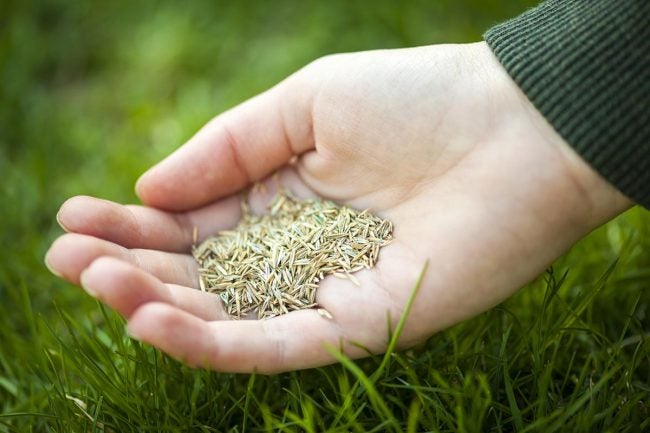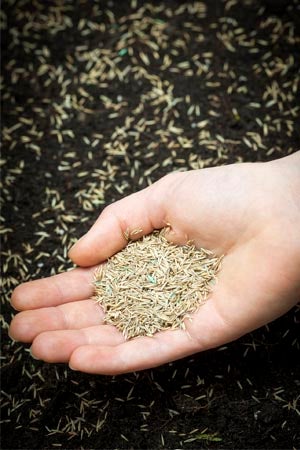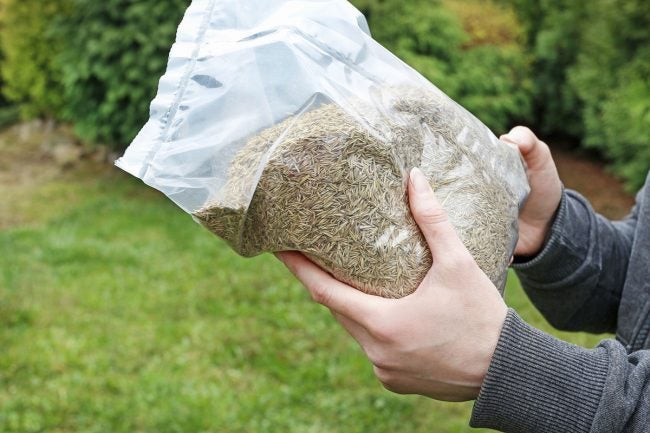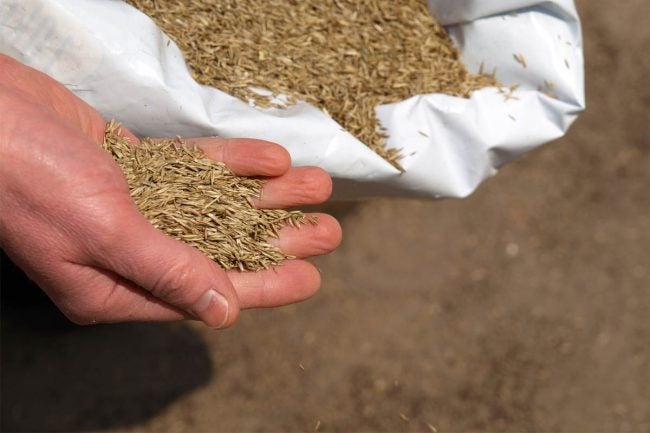Heed these simple storage solutions to help your leftover grass seed last until next season.

Photo: depositphotos.com
Q: I purchased two bags of grass seed last spring, and I am finally getting around to using them. However, one of the bags now has a musty odor. Does grass seed go bad?
A: Everyone wants a lush lawn with minimal effort and minimal expense, and planting grass seed can be a cost-effective solution. Known for its resilience, grass seed can typically last anywhere from two to 10 years, although the germination rate presented on the seeds’ package drops by 10 percent every year.
As well, it’s crucial that the seeds are stored in a dark, cool, and humidity-free space to keep them fresh and ready for germination, but you’ll read about in more detail below. So whether purchased from a wholesale distributor or your local home and garden shop, here’s what you need to know when solving the mystery, Does grass seed go bad?
Seed quality is a major influence on germination rate (and how soon seeds expire).

Photo: depositphotos.com
The grass seed germination rate—or the number of seeds that actually sprout in a season—is impacted by production location, harvesting conditions, and seed quality before you even bring home a bag. If the seeds were harvested in sub-optimal conditions, even in the best storage environments, the seeds’ germination rate will be significantly reduced.
When shopping, keep in mind that store-bought grass seed is packaged with a tested date and a germination rate, which will likely measure at 80 percent or higher. You can expect your seed to germinate at this rate when used within the first year post-packaging.
Buying seed from reputable distributors ensures you’re getting a quality product that was packaged and stored according to industry standards. And what about that bag of grass seed you inherited when your neighbors moved? Well, unless it’s unopened and in its original packaging, you might want to use it for nonconsequential seeding projects, such as overseeding.
The average time grass seed can last depends primarily on storage conditions.
According to the lawn-leader Scotts, grass seed can be stored for two to three years, that is if stored properly. However, even in ideal environments, the germination rate tends to decrease after storage. You should expect the initial germination rate to decrease by 10 to 20 percent for each subsequent year of storage. As the rate decreases, more seeds are required during sowing to fill the planting area.
The type of storage will affect the seeds’ longevity. If the seeds were placed into sealed containers immediately after harvesting, they will enjoy longer viability. Bagged seeds, on the other hand, tend to more quickly succumb to the negative effects of humidity. You can still use seed that’s been stored for longer periods of time, but more seed may be required to compensate for its reduced germination rate.
Avoid moisture, humidity, direct sunlight, and rodents when storing grass seed.
Excess moisture from rain and humidity increases the chances of fungal infection, molding, and premature sprouting. Rodents and other pests also present a problem because they feast on the seed, but leave its husk behind, which can be misleading to an untrained eye as the seed container still appears full.
While grass seed is reported to survive freezing temperatures in non-humid environments, it’s best to avoid temperature extremes as well––which means outdoor storage is not ideal. In addition, grass seed cannot tolerate being exposed to direct sunlight or rain for long periods of time.

Photo: depositphotos.com
Maximize grass seed shelf life with the right container and strategies.
Ideal conditions for seed storage begin with a dry, cool, and dark space. Seeds are a magnet for moisture, so drying the seeds and placing them in a sealed container is recommended for long-term storage.
Still, bulk storage bags will do the trick if you intend to plant the seed in the coming season. These bags have perforations that permit trace amounts of humidity to enter, reducing germination over time. Placing storage bags in a space with airflow can help limit the effect of moisture exposure. If you’re storing left-over seeds in a breathable sack, such as burlap, try placing an opened box of baking soda in the area to keep moisture at a minimum. As well, make sure to date and label leftover seeds. And always check the seeds for signs of excess moisture and mildew before use.

Photo: depositphotos.com
So, how can you tell if grass seeds are expired?
Everything comes with an expiration date these days––grass seed included. Seed bought from your local home and garden shop will display a sell-by date. If your seeds have surpassed their sell by date, they are not expired in the same way that we think of expired milk––it simply means that germination will be reduced. Even so, don’t neglect visual inspection because the presence of mold/fungus can indicate the grass seed has been damaged by moisture.
Performing a DIY germination test can also determine the seeds’ viability. Simply place 10 seeds on a damp paper towel inside a sealed plastic bag. Place the bag in a warm area for 10 days and watch for germination. If you find that fewer than five of the seeds sprout, the seed has a less than 50 percent viability rate. At a 50 percent viability, you’ll want to plant double the recommended amount.
tinyurlis.gdv.gdv.htu.nuclck.ruulvis.netshrtco.detny.im
مقالات مشابه
- فعال-سربازان وظیفه نه خوش آمدید در DC شهردار می گوید
- 'اقدام با قلب خود:" چگونه نیروی هوایی به رهبری خدمات در صحبت کردن در مورد مسابقه
- ایران حکم دستگیری برای مغلوب ساختن پیشی جستن می پرسد اینترپل برای کمک به
- خیلی هیجانزده. شما نخواهد شد انجام شد با اسباب بازی
- شرکت صادرات و واردات کالاهای مختلف از جمله کاشی و سرامیک و ارائه دهنده خدمات ترانزیت و بارگیری دریایی و ریلی و ترخیص کالا برای کشورهای مختلف از جمله روسیه و کشورهای حوزه cis و سایر نقاط جهان - بازرگانی علی قانعی
- شرکت صادرات و واردات کالاهای مختلف از جمله کاشی و سرامیک و ارائه دهنده خدمات ترانزیت و بارگیری دریایی و ریلی و ترخیص کالا برای کشورهای مختلف از جمله روسیه و کشورهای حوزه cis و سایر نقاط جهان - بازرگانی علی قانعی
- شکارچی گنج می گوید او فریب توسط مرد باهم ادعا می شود یک قهرمان جنگ دانشمند
- فرماندار اوکیناوا می خواهد سخت تر اقدام به 61 تفنگداران دریایی آلوده
- کربن فعال | تجهیز یار
- ثمین نصرت فوری سوپ سبز با قدرت عنصر